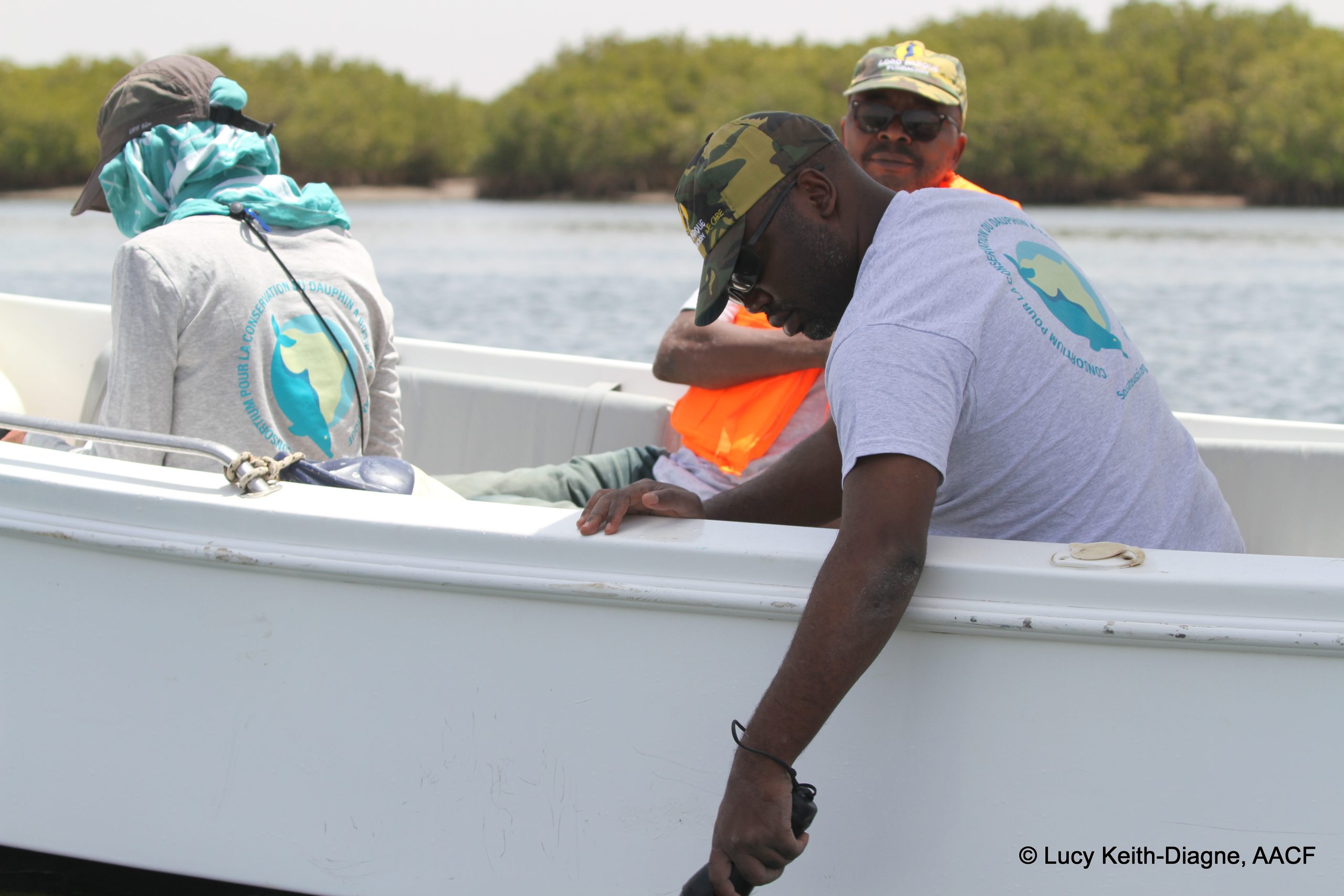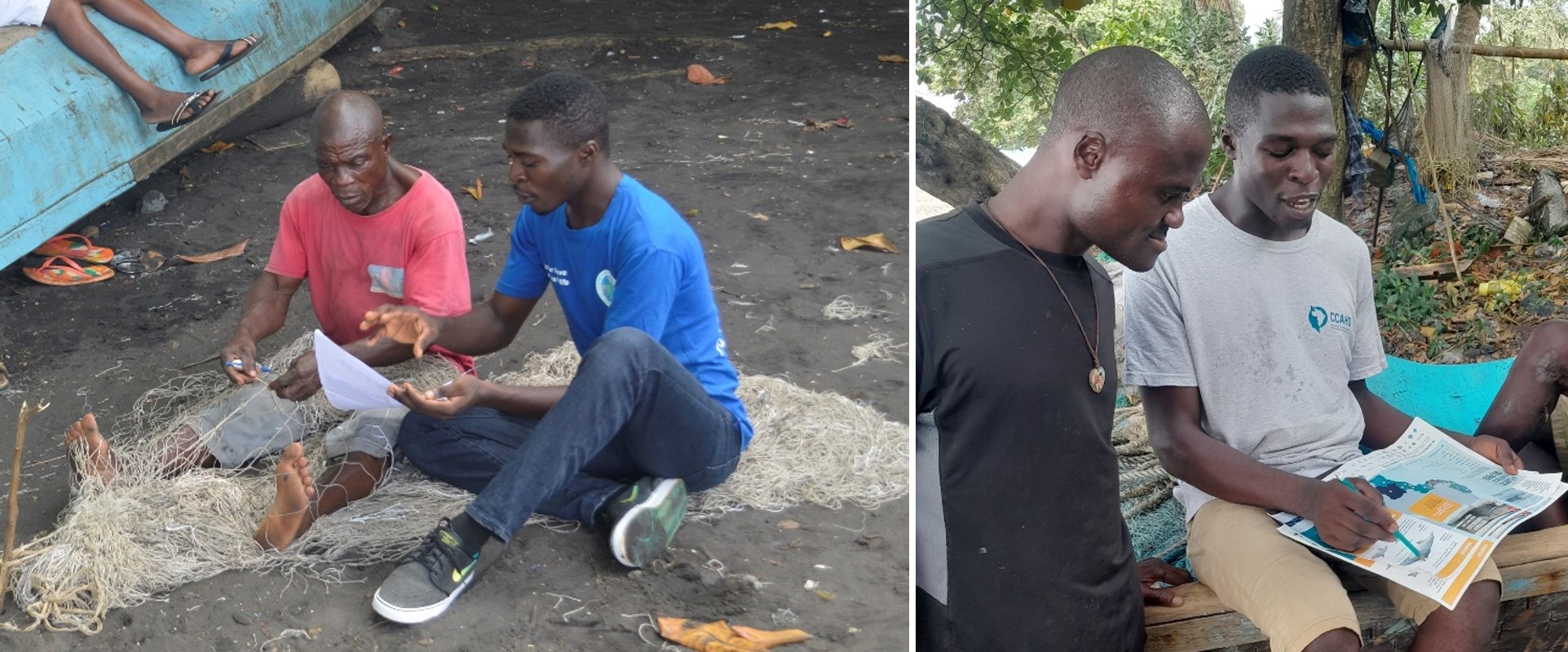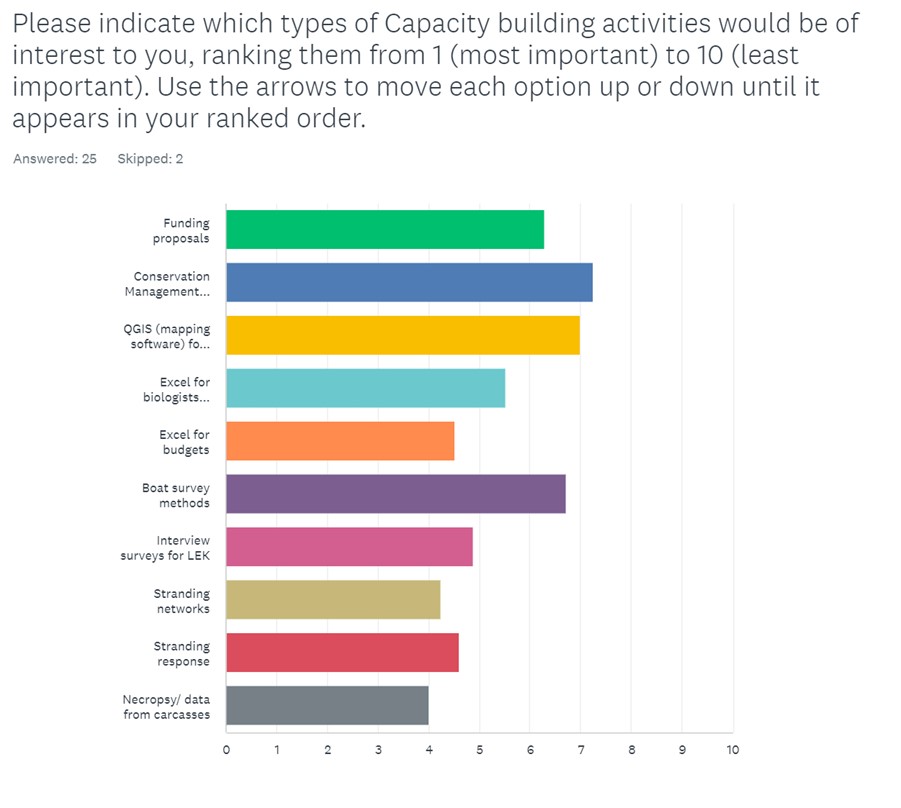Capacity building for range country scientists and conservation organisations
The CCAHD works in a range of different ways to support Atlantic humpback dolphin range country scientists and conservation organisations and to build their capacity to study and protect the species.
Resources for CCAHD partners
The CCAHD has produced a range of resources that trained scientists, park rangers or coastal community members can use to collect valuable data on dolphins and their conservation needs. These are all freely available for download on the CCAHD Website and include:
- Regional species identification cards and factsheets on humpback and bottlenose dolphins;
- Step-by-step protocols for data and sample collection from dolphin carcasses;
- Research protocols for boat-based dolphin surveys, and photo-identification;
- Research protocols for fisheries interview surveys.
CCAHD members are also available to provide (online) training courses and support to partners wishing to use any of these resources to implement surveys.

Field-based training opportunities and regional exchanges
Projects conducted by CCAHD partners that involve field-based research, such as the project hosted by the African Aquatic Conservation Fund (AACF) in the Delta Saloum in Senegal, and the long-term research and conservation project in Guinea provide hands-on training opportunities for Sousa teuszii range country scientists. In Guinea this includes scientists working with the national aquatic research institute (CNHSBC) as well as the NGO Guinea Ecologie. In Senegal, this includes a local scientist who pursued her MSc (see below), as well as visiting scientists from Gabon, Cameroon, Nigeria, the Gambia and Mauritania, who were integrally involved in boat-based surveys in 2021, 2022 and 2023.

Visiting scientist Aristide Takoukam from Cameroon measures water temperature and depth during boat-based dolphin surveys in the Delta Saloum, Senegal.
Support for range country scientists pursuing higher academic degrees
The CCAHD continues to look for opportunities to leverage international expertise and institutional support for range country range-country scientists in their pursuit of higher academic degrees focusing on cetaceans in their countries Examples include:
- African Marine Mammal Conservation Organization – AMMCO staff member Cedrick Fogwan who completed a master’s program at the University of Douala in Cameroon. His studies combined citizen science with interviews and boat-based surveys to assess cetacean diversity, distribution and threats, with an emphasis on the Atlantic humpback dolphin in Cameroon. Cedrick received regular advice and support from CCAHD partners and used CCAHD resources such as the Sousa teuszii fact sheet and the regional marine mammal ID guide during his fieldwork. Cedrick’s master’s project will provide baseline knowledge and help inform the conservation and management of the Atlantic humpback dolphin and other cetaceans in Cameroon.
- Judicaël Kema Kema is a member of the management board of the CCAHD. In addition to his full-time job at the ANPN – Agence Nationale des Parcs Nationaux du Gabon, where he oversees marine research and monitoring programs, he is preparing his PhD at the University of La Rochelle (France) and at the Omar Bongo University (Gabon). His research focuses on the ecology of cetaceans in Gabonese waters and more particularly on marine protected areas. His studies will combine geographical and biological sciences to estimate the abundance, distribution, and habitat preferences of 4 main species: Atlantic humpback dolphins, bottlenose dolphins, humpback whales and common dolphins. He is supervised by CCAHD member Professor Vincent Ridoux, and benefits from the support of other members of the CCAHD. Regis’ work will help inform the conservation and management of the Atlantic humpback dolphin and other cetaceans in Africa.
- African Aquatic Conservation Fund‘s Diana Seck, recently completed a Masters programme at the University of Algarve in Portugal. Her studies focused creating the first long-term photo identification catalog for the teuszii population in the Delta Saloum, Senegal. During this research, funding from the Loro Parque Foundation made it possible to set up a formal collaboration with Emma Longden, a Research Fellow at the University of St Andrews, Scotland, and Gianna Minton, CCAHD General Secretary with experience in coastal dolphin research and photo-identification. With years of dolphin photo-identification experience under her belt, Emma helped Diana work through the thousands of images collected during surveys in Senegal in 2021-2022, and to build the catalogue of known individuals, while Gianna supported Diana in the field, helped to develop the photo-ID protocol, and provided feedback on draft thesis chapters before they were submitted. Matching individuals across encounters allows researchers to estimate the population size, how far individuals range, and who is regularly seen with who. Diana’s Master’s project will help inform conservation and management of the population.

Diana Seck recently submitted her Masters Thesis to the University of Algarve. She analysed two years’ worth of photo-identification data from the population of Atlantic humpback dolphins in the Delta Saloum, Senegal.

Cedrick Fogwan’s Masters thesis was based on the results of interviews with coastal fishers to better understand Atlantic humpback dolphins and the threats they face in Cameroon.

Judicael Regis Kema Kema is pursuing a PhD focusing on cetaceans in Gabon, under formal supervision from CCAHD member Professor Vincent Ridoux of La Rochelle University in France.
Planning for virtual and in-person workshops and courses
Recently the CCAHD conducted a survey to assess range-country partners’ needs for other forms of capacity building activities. Results indicate that there is a perceived need for capacity building in all areas of research and conservation, ranging from how to write grant proposals, and how to conduct boat-based surveys for cetaceans, to how to use mapping and other software and how to conduct necropsies on dead cetaceans. The CCAHD has secured some modest funds to begin offering this training and is looking for more funds to support these needs.

CCAHD range country partner responses to priorities for capacity building in the form of on-line or in-person training workshops.
